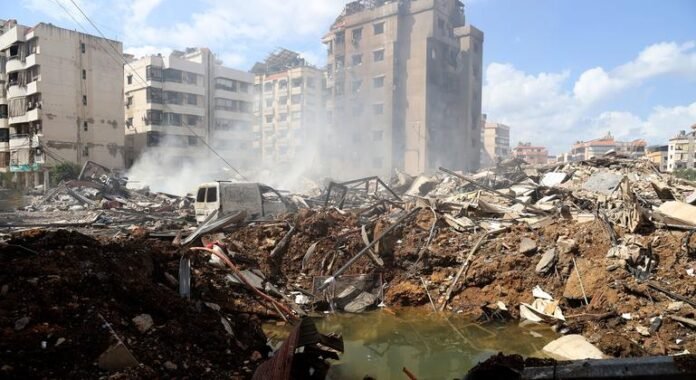The United Nations refugee agency – UNHCR – said that on September 23, intense Israeli airstrikes left around 120,000 people homeless within a week.
As of October 20, the number of displaced people in Lebanon reached 89,000 due to Israeli attacks and bombings.
Apart from them, around 4.25 lakh people have left Lebanon for Syria till October 21. About 70 percent of them are Syrian refugees and 30 percent are Lebanese.
In addition to loss of life and large-scale displacement, the Lebanese and Syrian people are facing the fundamental uprooting of families and communities, UNICEF said in its latest update. Because of this, the already multifaceted crisis situation has become more complicated.
The organization stressed the need to significantly increase the level of sustained international support and assistance to people of both Lebanese and Syrian origin.
Israel’s evacuation orders extended
The Israeli army’s evacuation order remains in effect in about a quarter of Lebanon. The latest evacuation order has been issued from a large area within the city of Tayre, south of Lebanon. This area is within the operational area of the United Nations Interim Force (UNIFIL).
After that, Israel quickly launched airstrikes on Tyre.
According to the United Nations Educational, Scientific and Cultural Organization (UNESCO), the city of Tayyar was settled in 2750 BC and is believed to be directly related to various stages of human history.
The fierce battle continued
Meanwhile, there are reports of continued fighting between the Israeli army and Hezbollah fighters around the Blue Line. It is noteworthy that the Blue Line is the border line between Israel and Lebanon.
UN headquarters deputy spokesman Farhan Haque told a regular press conference on Wednesday that UNIFIL recorded 1,028 cross-border missile strikes on Tuesday, which were fired from areas south of the Blue Line. These rockets targeted Al Kawajah, Aytorun, Markaba, Tallousah, Ait Taib, Al Khaim, Kafar Kela.
The deputy spokesman said more than 80 missile or rocket attacks were recorded from north of the Blue Line. UNIFIL is also reporting continued large-scale violations of Lebanese airspace by Israel.
Attacks on banks in Lebanon condemned
Meanwhile, Ben Shaul, an independent human rights expert on countering terrorism, expressed deep concern about Wednesday’s bombing of a financial institution linked to Hezbollah in Lebanon.
He said the Israeli attack violated international humanitarian law because it targeted a civilian structure.
Special Rapporteur Ben Shaul said that international law does not permit attacks on an enemy’s economic or financial structures, even if they support the enemy’s military activities.
Israel has publicly warned that it will attack financial institutions linked to the Hezbollah organization because, it says, they provide funds to Hezbollah.
Ben Solon reiterated that in an armed conflict or war, only “military targets”, clearly defined as targets or equipment that contribute effectively to military operations and whose destruction does not provide a specific military advantage, can be targeted.
The economic activities of an enemy alone, such as fighters and weapons, do not directly contribute to military action, said Ben Shaul, Special Rapporteur-designate of the UN Human Rights Council based in Geneva.
UN Special Rapporteurs act in their individual capacities and are independent of the UN. Human rights experts are not UN staff and do not receive any salary from the UN for their work.
Peacekeepers are in danger
Meanwhile, concerns have also been raised about the security of UN peacekeepers deployed along the Blue Line in Lebanon and the continuity of operations. These peacekeepers affiliated with UNIFIL patrol along the Blue Line and assist the Lebanese people when needed.
Deputy Spokesman Farhan Haque said the mission reported that ongoing fighting in UNIFIL’s area of operations was threatening the security of UN peacekeepers and their ability to implement UNIFIL’s mandate. It is noteworthy that UNIFIL is deployed there under Security Council Resolution 1701.
“We again remind all parties of their responsibility to ensure the safety of UN personnel and to ensure the security of UN premises at all times,” the UN deputy spokesperson said.

